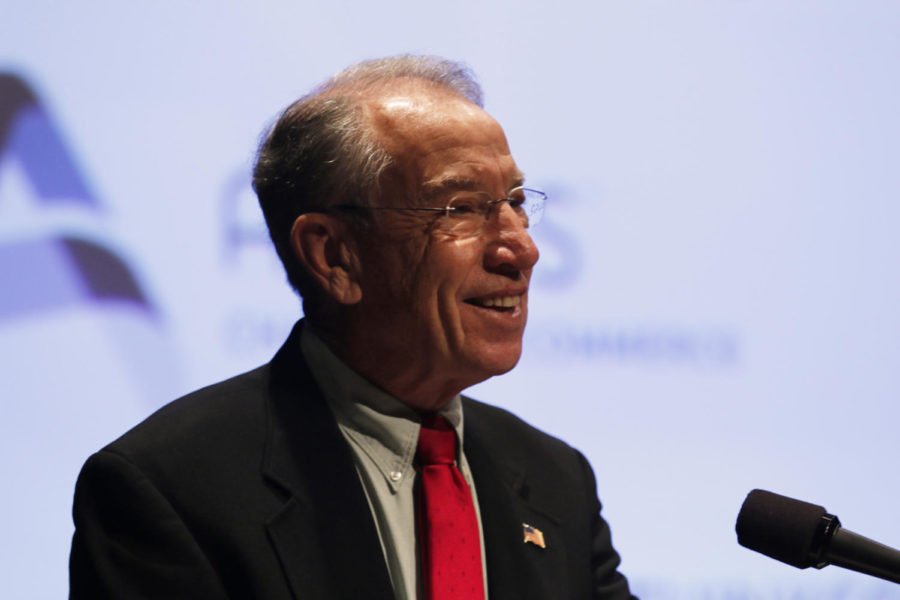Sen. Chuck Grassley stresses cybersecurity
Richard Martinez/Iowa State Dail
Sen. Chuck Grassley spoke in the Scheman Building on Sept. 4, addressing the issue of cybersecurity and the responsibility of protecting one’s sensitive information. Grassley mentioned his activism on the topic with his engagement in legislature supporting higher security measures for businesses and organizations.
September 5, 2014
Sen. Chuck Grassley spoke on cybersecurity at the Cyber Security Alliance event at the Scheman Building on Sept. 4.
The Cyber Security Alliance hosted the event to bring attention to the importance of cybersecurity and spread the word on a new online safety concept — two-step authentication.
This year, account hacking has been at its peak. All over campus, students are constantly logging into apps such as Facebook, Twitter and Instagram and accessing homework assignments and financial aid through Blackboard and AccessPlus.
But what happens when simplicity becomes overrun by advancements in technology? Hackers want your personal information, whether it’s for money, your identity, or personal gain. In a world of endless possibilities for technological advancement, security is now more relevant than ever before.
“There is no definitive answer to complete online security,” Grassley said. “There is a tremendous flaw in cybersecurity and there has to be a great deal of flexibility and a working relationship between the government and the private sector in order to come to a solution.”
Iowa State’s President Steven Leath also spoke at the event, suggesting that higher education in the cybersecurity field would be a key component in the solution to defending the nation’s cyberspace. One of the new and effective ways of protecting one’s personal accounts is with what the Alliance calls two-step authentication.
“A password alone is not enough in today’s world,” said Kristin Judge, the program leader. “Two-step authentication is a secure way to insure your online accounts’ safety.”
Two-step authentication is a safety feature that goes above and beyond a password. When an individual logs into his or her account, he or she is not only required to type in the password but also would have to have a short-term security code sent to his or her phone to be typed in along with the password.
Judge strongly suggests that people use the feature for their bank accounts, email, PayPal accounts and other various websites that contain important information.
“This is an ongoing problem we have to work with,” Grassley said. “The problem with today’s technology is that we share so much — maybe too much — private information online. It’s a fact of life. We all have to be diligent to protect ourselves.”
Grassley also mentioned that not updating online security procedures regularly could have a devastating impact on the economy, both locally and nationally.
Doug Jacobson, director of the information assurance center at Iowa State, mentioned that the university is now offering a 100-level class to students on cybersecurity.
“We have several undergraduate programs focused on cybersecurity,” Jacobson said. “We train hundreds of students in the area of cybersecurity. We also outreach to high school students and community colleges to become educated on the topic.”
The elderly and children are among the most targeted victims by hackers on the web. These groups are found to be more often deceived by pop-ups online, convincing fraud emails, fraud trial offers and harmful download applications.
“I think that students can also be harmed as well,” said Ann Black, AARP Iowa’s associate state director for communications. “Many students do not take the time needed to learn what they can do to protect themselves online.”
Students are encouraged to visit and use the resources listed on the Stop Think Connect website and use the tools that other organizations are recommending for internet safety.







